|
This interview was read
10328 times
by Ignacio Illarregui Gárate
Transcription by María Jesús Sánchez
This interview was made last time Christopher Priest visited our country. Exactly in June
17th 2003, when he came to Madrid to present The Extremes. Since then a lot of water has passed under the
bridge, and although we delayed more than justifiable, yet we can offer you this friendly chat we, David Fernández,
María Jesús Sánchez and I, had in his hotel reception during forty minutes.
The day before we, among others, went to the presentation of the book in the House of
America. In this place, he was introduced by Carlos Ruiz Zafón, author of La sombra del viento, and both of
them dialogued intensely about the circumstances of the creative task. What a pity we haven`t any transcription,
that was really memorable!, as there`s no way to bring to you the sense of humour, nearness, simpathy and sharp
comments displayed by Priest in his answers. Written words are cold and limited, so we must resign ourselves with
his intelligency, his way of understanding some topics, his tastes...
For those who doesn`t know him, Christopher Priest is one of the best celebrated authors
of fantastic literature in the last thirty years. That reputation comes mainly from two caracteristics: the superb
way of planning his plots in his stories, and the way in which it is connected with the topics. Books as
The Separation, The Prestige, The Glamour, The Affirmation, The Dream of Wessex,
The inverted world, Fuge for a Darkening Island, the above mentioned, The Extremes, or the
collection of short stories called An Infinite Summer witnesses this enough.
Before leaving you with him, I liked to thank Mr. Priest for his kindness, which showed in
that day and now. Some weeks ago, he has answered very kindly some questions about his last novel published in
Spain, and revisioned his previous answers. I want to thank Minotauro as well, for publishing his books, the
opposite of what we consider a bestseller, and to have the interest in bring him to Spain. And last, to
María Jesús, for the hard work made with the trasncription and translation.
Ignacio Illarregui Gárate (Nacho)
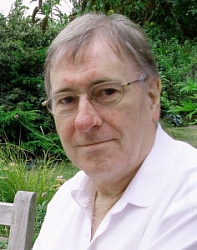 |
|
Christopher Priest |
|
The Extremes deals with virtual reality. Why do you feel this tool so atractive?
Because of several reasons. One, it can happen. You know, technology will take us there. Secondly, I`m
worried about it. Thirdly, I´m a novelist, and novelists deal with metaphors and it seems to me that, when I´m
writing a book, I always try to deal with the act of writing fiction as a part of the subject. A lot of people
don`t like that. They say who cares, but I care. I feel the working of virtual reality is very similar to the
process as a writer goes to when you think of an idea and try to write it.
Another topic is violence through guns and the so-called extreme experiences. Where does your interest
in those things come from?
Well, you heard me last night speaking about it, my closeness to this. My wife is american, and she left
America because of that culture of violence there. I`m really against violence; you know, if something threatens me,
I scream round all the way.
A situation denounced by Bowling for Columbine...
Yes, I´ve seen Bowling for Columbine. It`s really shocking how many guns there are. I mean, if you go
to an american house, there`s one thing that particularly surprises me. I`m thinking in a couple of
friends of mine. One day we asked them, how do you feel on guns?, and they answered, “oh, that`s serious, very
serious!” And at this point they came out and returned with twenty guns... That`s insane, they could have guns
for an army there...
My feeling is that if you have a gun, there is no point in having a gun if you are not prepared to use it.
And if you are prepare to use it, you must be prepared to kill. For me this step it`s really unthinkable, to kill
someone.
The horrible thing is the fact that people that have twenty guns, and they must be typical, is that they are
all prepare to kill. In America you get what I call “the cult of the expert”. So they say when you have a gun you
learn the rules to become an “expert”. It seems to me as an excuse, it`s a way of special pleading.
Long time ago I was present at a massacre, you know, and the kid was a young man of twenty years, he was an
“expert”: he bought a gun, came to a club and trained himself till he could get a good shot... The whole
thing is insane!
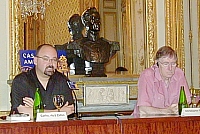 |
|
Carlos Ruiz Zafón and Christopher Priest |
|
I wanted to ask you about Matrix, where we can find a virtual world and a trivialization of
violence as well, that looks as dancing...
I`ve seen only the first. I think it´s pornography. It´s “the culture of the expert” what makes violence
beautiful. The first book I wrote about virtual reality, 25 years ago, was in The Dream of Wessex. In that
book virtual reality is a kind of seaside resort, where people go on holidays to sit in the beach, do swimming,
make love... That`s my virtual reality, my vision of virtual reality. The dream goes wrong because the dream is
invented by a maligne outer presence, which is exactly the same plot as Matrix, except they do martial arts,
jump over buildings and things like that. And it looks more exciting that people in a beach making love. And I
prefer people in a beach making love. I don`t like people going out with sunglasses (laughs).
Times are changing...
I know it, I`m outdated (laughs)
Returning to our topic, in The Extremes, there`s a moment in which the main character begins to
confuse reality and fiction, as we can see in other novels you wrote as The Affirmation. ¿Why are you so
interested in the incertainty of perception?
I think that all my books are basically about ordinary dreams... (He stops) Well, the thing is that your
question is very complex, because I`ve written books about if for more than twenty five years and I can`t give a
quick answer. Essentially, there is a tension between objective outer world we see and experience and the fact we do
see and experience, that do I see this but you see that. I put “that is a table” and you look at it and think
that is a table too, but are you seeing the same table as me?. Being children this is only something to think about.
It`s not original. But it seems to me that nowadays in the outer world, in the media, and in the advertisings, in
the way fantasy is used to project something better than reality, that`s what makes this thing surprising.
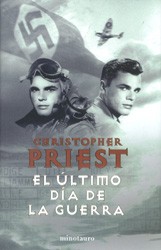 |
|
The Separation |
|
This year, Minotauro has published The Separation, translated as El último día de la guerra, an ucrony about the Second World War, that won
the BSFA and the Arthur C. Clarke. Is there any special reason to use a historical period as exploited as this one?
Well, I was born just at the end of the Second World War. I haven`t memories of it, but when I was growing up
all around was destroyed, the cities were bombed,... it was traumatic and it was a dramatic, a terrible scene. In
Britain people always say we “won” the Second World War, but to me it looked as if we had lost it. So I grew up
questioning that. As I was becoming an adult, I questioned that once and again and, particularly, I questioned the
role of Winston Churchill in the war, so that is the background.
During the war, there was a famous event with Rudolf Hess, who was the right hand of Adolf Hitler, traveled
to Britain with a peace plan and Churchill put him in prison without speaking with him, and he was in prison since
then. I just want to know why and, in fact, the whole thing is still top secret. So I thought to write a novel about
that. Because I was interested in fantastic. All I wanted to do is an alternative story where the peace was made in
1941 and the war ended at that point. It`s a sort of science fiction, obviously, in that sense.
It`s all quite interesting, I suppose you don`t know that just before Hess went to Britain, he flew to Madrid
and also to Lisbon. There is a lot of mistery in all that story.
How did the people in United Kingdom receive the pacifist thesis in your book?
I believe there is not a single accepted "understanding" of WW2 in the UK. Most people assume that Britain
and the USA "won" the war. (I'm sceptical about that.) Most people think of Churchill as a hero. (I do too, but I
also feel there is a much broader picture of the man most people ignore.) So you could say that most people in the
UK are not pacifists on the subject of that war.
However, as the world goes on, generations change, and events in the world change, nothing is certain any
more. For instance, at the time I am writing this, most ordinary people in the UK are profoundly ANTI war, in a way
I have never known before. I wouldn't say people are pacifist, but they believe Britain and the USA were wrong to
invade Irak, and are wrong to remain there now. So it's difficult to generalize. I think the true answer to your
question is that the opinions of people in Britain usually reflect all colours of opinion, and where people disagree
with each other they are generally tolerant of the differences between them. Pacifism has always been present here,
it has always had a voice, pacifists are treated tolerantly.
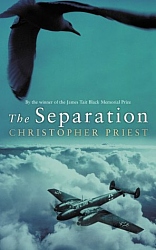 |
|
The Separation |
|
Which is the reason to build The Separation as a sort of a collage made by stories that are
converging or... diverging?
Because I'm a novelist and not an historian. I have a personal approach to understanding war. For instance,
I think the true history of the 1914-18 war is told through poetry. The Second World War produced hundreds of
personal accounts of individual experiences: the stories of bomber pilots, radar operators, nurses, and so on. I
used these extensively in my research for El último día, because they describe the odd, personal, surprising,
moving accounts of real experience that you never find in the official histories. Often, these personal stories
describe similar events from different points of view, sometimes disagreeing about what really happened. So when I
began writing, it seemed only natural that my novel should try to capture that sense.
(SPOILER: Select the text if you'd like read it)
For people who has read the book. All the novel is fruit of the hallucination of Joe Sawyer or every
story has its place in a different reality?
I think the answer to this is contained above. The hallucinations of Joe Sawyer are
only one element. I think the true story of El último día is the different texts, the different stories,
where each one is probably literally true, where no one is deliberately trying to mislead (except Joseph Goebbels!),
where there is always the possibility of people forgetting something, or not noticing something, of getting the
story wrong. All the fragments build a picture. The story is there, but there is not a single "true" or definitive"
version.
(END OF SPOILER)
The rol make by time in your novels it`s quite strange. It`s a sort of a game, it doesn`t look as a line,
but as an spiral...
Yes, that`s right, but it`s not a game. It`s a way of telling a story.
Because reality works that way?
Life is very messy: you collide things, you make statements you forget, you get lost, you come late..., you
know, in books people never get to the toilet (laughs). That`s related to memories. If I ask you what did you do last year,
in 2002, most people probably don`t remember unless it could be their child`s birthday, an accident or a very nice
day. What did you do in September 11th 2001? Life has a lot of levels and memory works at differente levels too,
and you remember in different ways. So when I`m writing about memory, I try to reflect that. I don`t like to
confuse, I don`t try to write a book that is imposible to read, but I want people to learn this, to recognize at so
a deep level they depend on his own memory.
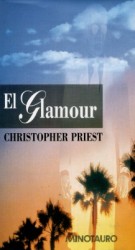 |
|
The Glamour |
|
And what about Borges?
Well, I haven`t read him for many years. I read him thirty years ago. It was like a shock, you know. I
consider he is one of the most important writers of the XX century for his sheer and new way of writing. Every
writer I know is deeply motioned and affected by him. He changed literature.
The Prestige deals with magic in the beginning of the last century. Why do you feel interested by
this topic?
I would love it as a kid, and magic is really a live performance when you see it in front of you. It`s not
the same on TV. In fact, TV has really ruin magic in many ways. So I wanted to write about the great period of magic
which is this period between the end of XIX and the beginning of XX.
In The Prestige we detect two kinds of magic, every one related to a character. Do these two
visions of magic exist? Do both of them coexist or has prevailed anyone over the other nowadays?
There`s a twin trend in magic, as you say. The rules they use are different in both kind of magic and it
seems as it could be a sort of competition between them. One is very tradicional, the one that deals with cards,
golf balls, which produce birds from hats, and the other comes very technological, look out for things, and get new
inventions as laser rays and things like that. If you follow the world of illusions you will find this, you can see
both of them on stage. When I was writing The Prestige I found that at that period Nikola Tesla was working, very
naturally, at the front of science of that time. It sounded to me quite strange and I said I wanted to help with
the “truth”. Even today would happen this colaboration, that someone should say I like your technique and
adapted it.
You told us about magic in TV. What do you think about David Copperfield, the magician?
He is famous for big illusions, but I prefer his magic for children, which is on a much smaller scale. For
children his magic is brilliant. He got a trick with a duck which was the funniest I`ve ever seen. He must continue
with that and stop with this stupid illusions.
The novel is, in some parts, a scientific romance at Wells`s way, to whom you paid homage in
The space machine and, not so plainly, in The Glamour. ¿What do you owe to him?
I love Wells, I loved his books when I was a kid. He was a very nice man. And was a great man. But in the
early part of the XX century he was probably the most famous writer alive. I will tell you something very
interesting about Wells: he wrote 150 novels and the best ones are the first six, which were all about
science-fiction.
Wells, was a student of Huxley, a great scientist who was like a Tesla to Wells. For me it`s a very natural
theme to write about it and pay homage to him.
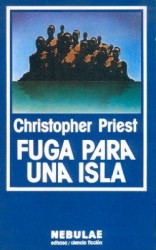 |
|
Fugue for a Darkening Island |
|
Early in the seventies you wrote Fuge for a Darkening Island, where you saw, prophetically, the
coming of a extreme right-winged party to the goverment, the massive inmigration from the Third World, and the
racial problems it would raise. How you see that thirty years later?
I wrote and intended Fugue as a metaphorical novel: the state of Britain and Europe in the early
1970s, a time when many old social assumptions were being overturned. It seemed to me that mass emigration of
refugees from troubled countries was going to be an increasing feature of life in Europe. Since those days, the
ideas in the novel have repeatedly become facts, perhaps from the time of the "boat people" fleeing Vietnam, up to
the present day when thousands of refugees from Africa, the Middle East and other troubled areas of the world are
seeking safety in the West.
The one thing that worries me about Fugue is the risk that it might be taken as supporting an
argument, from either side of the debate. It is not intended as a manifesto, either for uncontrolled immigration or
for the racists who oppose it.
On the whole, I believe the absorption of refugees from foreign countries has a stimulating and beneficial
effect on the host countries, but I do realize there are many serious short-term problems to be faced. The novel
touches on all these, but I don't see that it is "about" them.
Invertid World is probably your most “different” book. Though essentially is quite similar to
others of your books, is the most scientifical of all, the most “hard”; even the main topic could be one of a book
from Larry Niven. How did the idea come to your mind?
It`s very complicated, as you say. I wrote it long time ago, and I was quite young, I was 27 or 28. It was a
novel I worked through but still has the same things about time, memory, reality at the end.
Why do you still use fantastic elements in your stories, if could be an added difficult for many readers?
That`s why, I don`t want to make it easy. I`m serious, I`m a serious writer, and I have serious objectives
and I believe in writing for intelligent readers. But the fantastic is misunderstood, and to me is a very powerful
tool that a novelist has and should use. In fact, to my mind the word novel means new. Therefore every novel try to
be different.
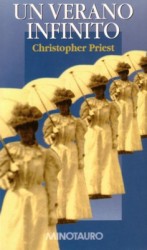 |
|
An Infinite Summer |
|
All your novels are very well structured and are a plain work of narrative engineering. Do they take a
lot of time from you?
It takes me years to work out a new novel, because the intricate structure is difficult and exacting. I
usually leave a gap of about four years between each novel, during which time I am trying to work out the next
one.
I found surprising the little number of short stories you have written. Don`t you find attractive this
genre?. Are you uncomfortable writing them?
Yes, short stories are an attractive form of writing, but I find them devilish difficult to do! At least one
of my short stories took longer to write than at least one of my novels. That's no excuse, but in general I am
usually fairly dissatisfied with my short stories after I have written them. It's a real discipline, a real art. I
like to think one day I might master the form, but I haven't done so yet.
To finish, three simple questions. What are you writing now?
I'm in the planning stages of a novel to be called (provisionally) The Decoy. It's about islands no
one can see.
Which of your books do you consider to be the most easy to read for someone who has not read a lot?
The Prestige, it`s interesting for someone to start. It`s different to others but the best in that sense.
And the best one?
The Separation.
Links
Bibliografía de Christopher Priest en Cyberdark.net
Narraciones originales de Christopher Priest en Cyberdark.net
Página personal de Christopher Priest
The Last Deadloss Visions (inglés) – Artículo de Christopher Priest sobre la tercera entrega de Visiones Peligrosas, la antología de relatos más anunciada del mundo mundial y que, después de treinta años, sigue sin publicarse.
Christopher Priest: de la ciencia ficción tradicional a la fantasía de la identidad y la memoria – Especial dedicado por elmundolibro aprovechando su visita a Madrid en Junio de 2003, orquestado por Alberto Cairo. Incluye una breve retrospectiva de su obra y un registro de su encuentro virtual en el chat literario de El Mundo
Reseña de Fuga para una isla
Reseña de El mundo invertido
Reseña de La Afirmación en Cyberdark.net
Reseña de Un verano infinito en El sitio de ciencia ficción
Reseña de El Glamour en Gigamesh
Reseña de El Prestigio en Bibliópolis
Reseña de Experiencias Extremas, S.A. en Cyberdark.net
Reseña de El último día de la guerra en Bibliópolis
Foro de Cyberdark.net – Ciencia ficción – Experiencias Extremas, S.A. – Comentarios sobre la novela
Foro de Cyberdark.net – Ciencia ficción – El último día de la guerra – Comentarios sobre la novela. Contiene spoilers puros y duros. No leer si no la has acabado.
|

